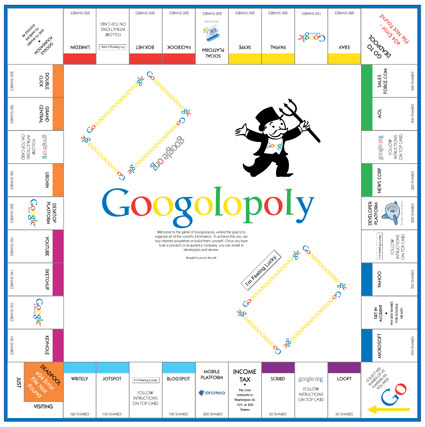Monopoly 2.0, Googolopoly by box.net:

All posts about Search Engines
I guess you noticed today is Valentine’s Day and just like last year Google changed the logo at the Google start page:

Clicking the logo takes you to the result page for “valentine’s day“.
Yahoo! did a similar thing with their logo. Some birds fly in, start flirting and kiss at the end:

Clicking the logo takes you to the Yahoo! Events Valentine’s Day page.
According to Wikipedia, a parody is described as follows:
A parody is a work created to mock, comment on, or poke fun at an original work, its subject, or author, by means of humorous or satirical imitation.

As biggest search engine in the world, Google had its part of parodies over the last years. Some went offline because Google didn’t like them and threatened to prosecute, but some managed to stay online. I present to you The Top 10 Google Parodies… that are still online…
It’s only a few months since Google decided to provide its search engine result pages with additional media. The so called “universal search” was born. The Google SERP’s no longer only offer webpages, but also news, images, videos, maps, stock information,… Sure it will make our SEO work more difficult, but also more challenging.

And now Yahoo! seems to be going the same way. Is Yahoo! gradually adding extra information to its result pages? Sure looks like it! Techcrunch noticed Yahoo! SERP’s today that mentioned the number of times a web page was added to del.icio.us.
When you’re looking for a Content Management System or CMS, don’t just accept the first proposal made by your familiar web designer or developer. There are tons of great and easy to use content management systems out there, but most of them aren’t search engine friendly. And if there is one thing you don’t want to be behind on your competitors, it is your online visibility and findability. By presenting your web designer or developer a checklist of requirements the CMS should meet, you can avoid a lot of problems regarding rankings in the search engines up front. Adjusting the CMS later on can cost you a lot of time and money.

I’m going to present to you a list of requirements a search engine friendly CMS should meet. This list is not exhaustive and your additions and comments are more than welcome. Whether the content management system runs on PHP or .NET, whether it needs Apache or IIS, it doesn’t mind, these are some main criteria for a CMS you won’t regret : (more…)
I realize most comments about the newest Search Engine Wikia aren’t exactly great, but to be honest: I like it… I really do !!!
But first, what is this Wikia everybody is talking about ? Wikia is the new, long awaited Search Engine launched by Wikipedia founder Jimmy Wales. His name is often followed by the epithet “Google’s worst nightmare“, although I don’t really see why ;-)
A while ago, he promised the internet (Wikipedia) community he would build a search engine that could compete with Google. And not just that, everyone would be able to contribute to the search results by adding his own content or by scoring the ranking sites. A Search Engine 2.0 as you will. And yesterday, the first Wikia alpha version was launched.
Before I tell you what I really like about it, I think I should start with why I’m disappointed in Wikia: (more…)
 As you all might know, Google Search doesn’t like (or even allows) automated requests and queries. If you run a script or program that handles too much requests too fast, Google will stop serving results. You might also know that when doing SEO (Search Engine Optimization) for a website, it sometimes is necessary to check the results of your efforts. In other words: sending automated requests to Google sometimes is needed.
As you all might know, Google Search doesn’t like (or even allows) automated requests and queries. If you run a script or program that handles too much requests too fast, Google will stop serving results. You might also know that when doing SEO (Search Engine Optimization) for a website, it sometimes is necessary to check the results of your efforts. In other words: sending automated requests to Google sometimes is needed.
Yesterday while browsing on YouTube I ran across a 500 Internal Server Error. Never happened to me before on YouTube, but I didn’t mind. The YouTube 500 Error page seems to contain a funny message, and if there is something I like it is funny errorhandling.
A team of highly trained monkeys has been dispatched to deal with this situation. Please report this incident to customer service.
And that reminded me of something I learned when I started SEO : one of the first things you should implement when setting up a new website are user friendly AND search engine friendly errorpages. Especially the 404 Page Not Found error page is one that should be perfect. For the search engines it should return a 404 status code. For the users it must contain a clear message that says their browser asked for a non existing page and they should be able to click through to the home page or search for another page. You can find more on The Perfect 404.
So I decided to take a look at the 404 error pages from big guys like Google, Yahoo!, YouTube, Live Search, LinkedIn, … And what I found wasn’t always exactly perfect on the usability side …
So you managed to set up your new blog. You were much excited about it, told all your friends and some of them even took the effort of paying your new site a visit, but now the amount of daily visitors dropped to somewhere near freezing point.
How do all those websites generate traffic ? Thanks to search engines like Google, Live and Yahoo!. Great ! But before search engines can send traffic to your site, it has to be indexed. In the post “How to SEO your WordPress blog and make Google like it” I promised to show you ways to get your new blog noticed and indexed by the search engines. So here we go : there are several ways to accomplish indexation and attract the search engine bots or crawlers to your new website, but there’s one road you don’t want to take…